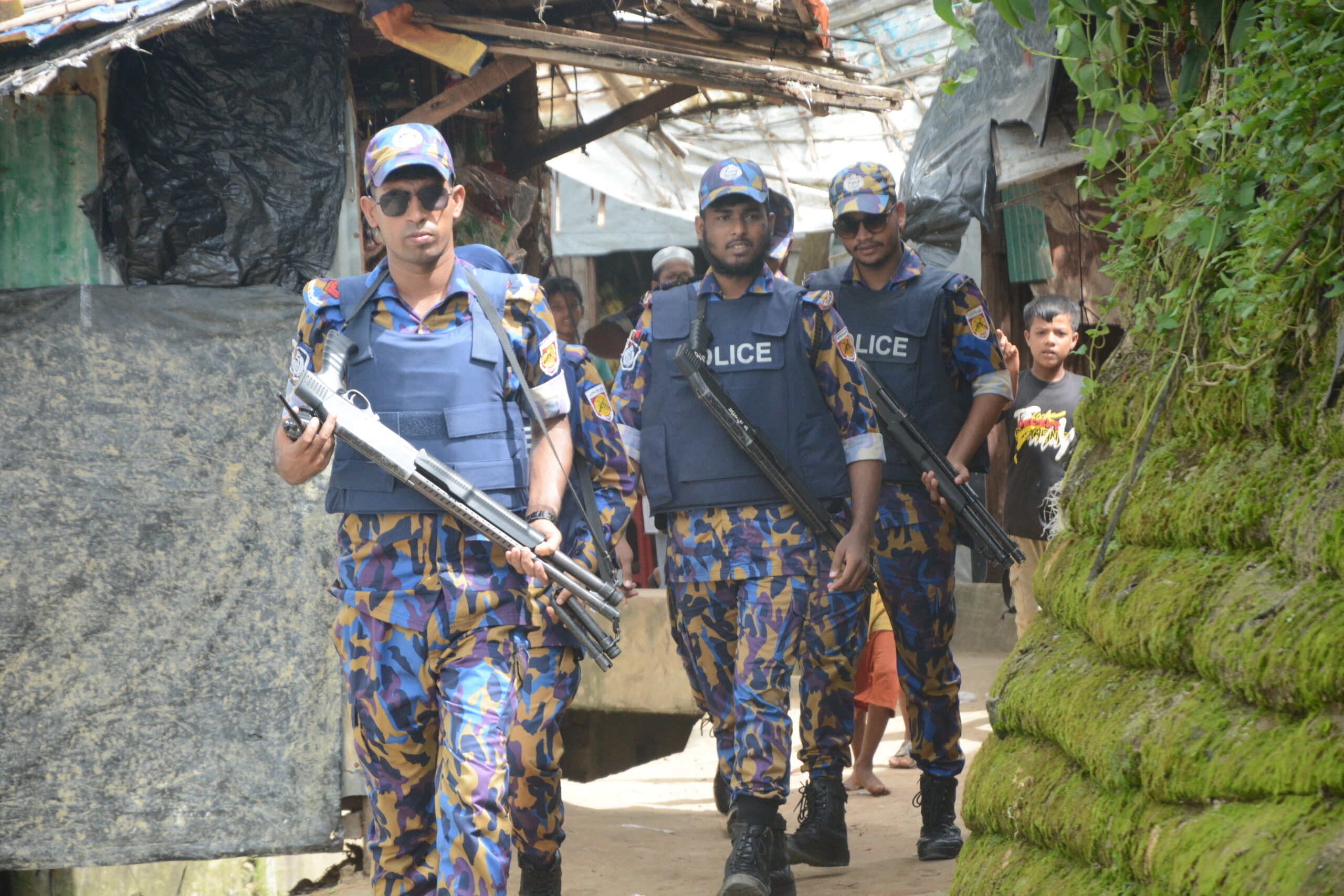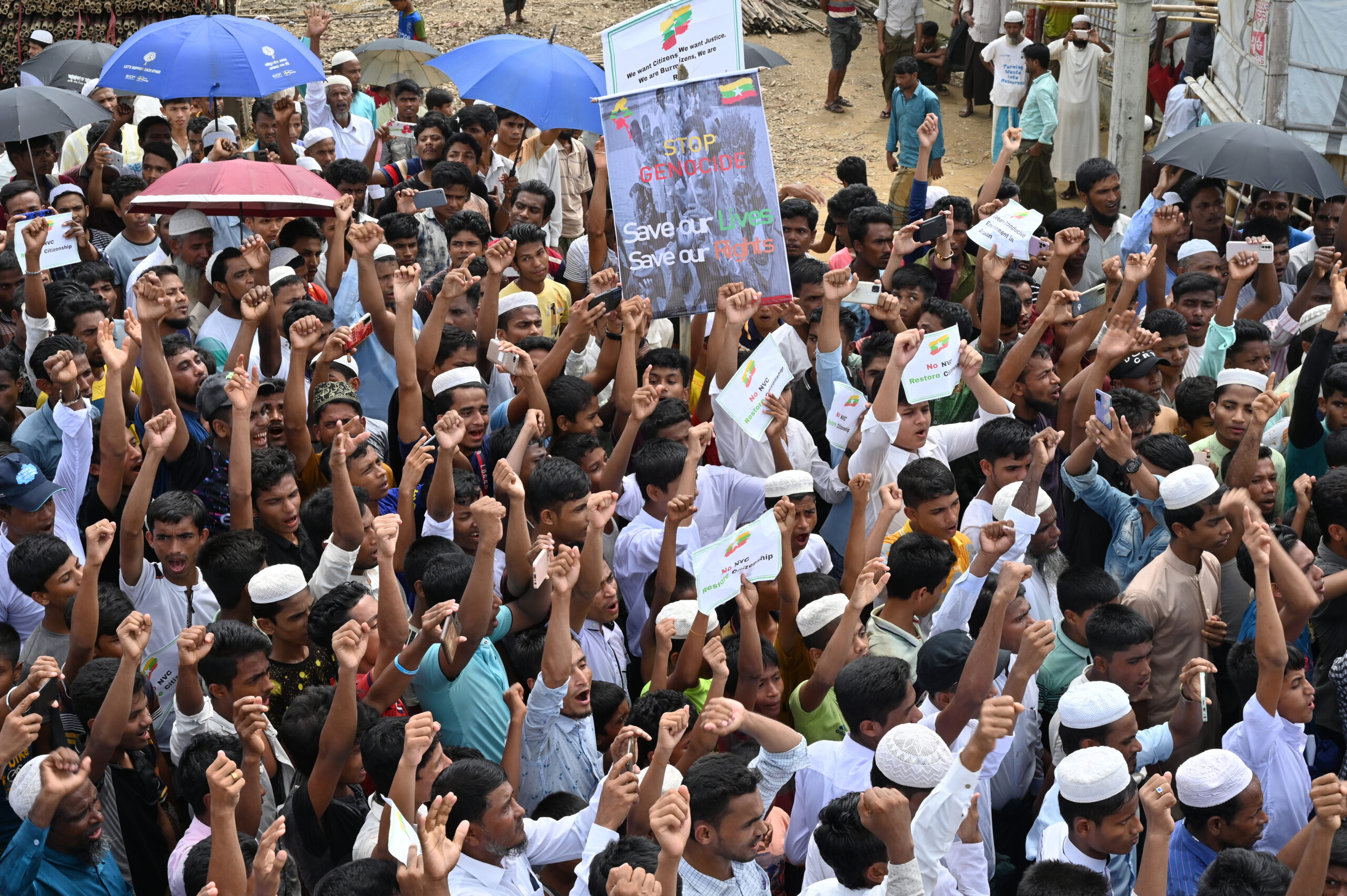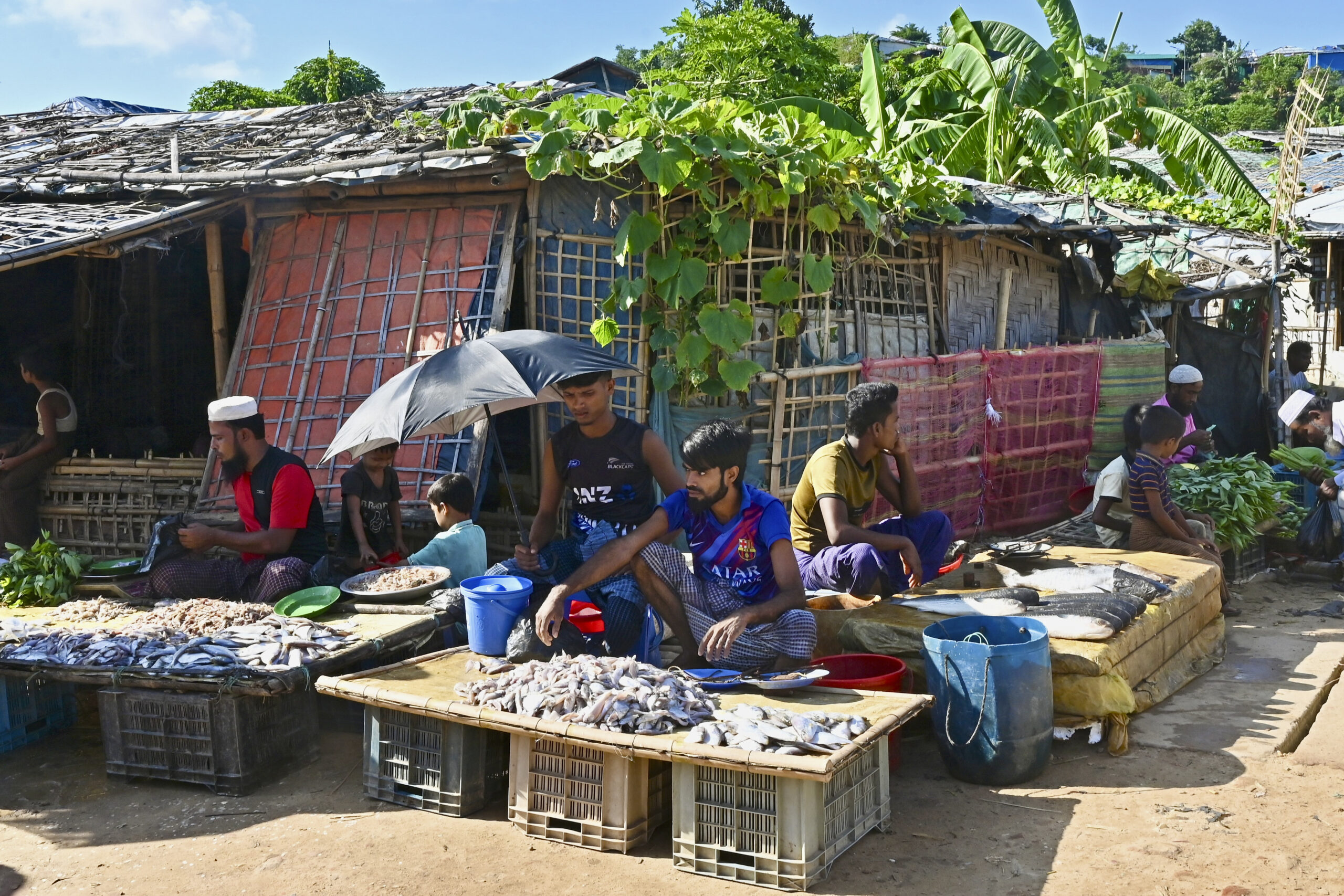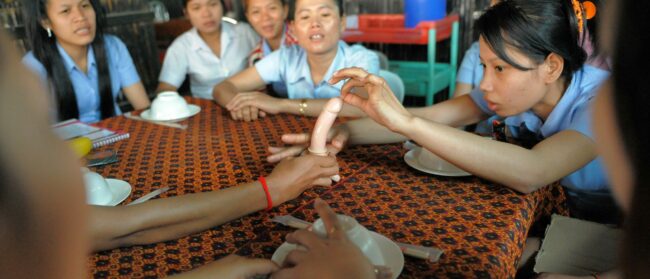Moments before the deadly attack, Sabikun Nahar, a Rohingya refugee, was in her kitchen with her nine-year-old daughter, Sadia. They were preparing for the night’s prayer and reciting passages from the Quran.
Not far across the border in Myanmar, clashes, mortar shelling and airstrikes were flaring up in northern Rakhine State. But even on the Bangladesh side of the border, the security situation in the camps have become insecure according to rights groups, local government, and countless refugees.
Although she could hear the sounds of war from a distance, Sabikun Nehar couldn’t have known that the evening of 16 September was about to be ripped apart by violence.
“Suddenly I felt a tremor like an earthquake,” she said. “Sadia hugged me in fear. I peeked from the kitchen and saw that people had gathered in a bamboo bush. At that moment, everyone was shocked that the Myanmar Army had fired mortar shells into Bangladesh territory.”
Within minutes, Bangladesh border guards in the area responded, moving her family and others away from the initial point of attack. The first mortar did not explode on impact. But that was just the beginning.
About ten minutes later, another volley of mortar shells fell from above, this time into the Tumbro Canal, an area where many Rohingya refugees live. The ordnance exploded, knocking Sabikun Nahar’s family to the ground. The blast instantly shattered Sadia’s lower teeth out of her mouth.
“I screamed seeing Sadia’s face. I’m a mother, I don’t want to remember that moment. My daughter was bleeding too much” Sabikun Nahar said. She rushed her daughter to a nearby Medicines San Frontiers field hospital for treatment.
It quickly became clear that Sadia would need additional surgery and was sent to a major hospital in Bangladesh. Although medical treatment was free, there were further costs involved. Medicine must be purchased and certain types of food are required after treatment is administered. But many refugees cannot afford these costs.
“We are refugees. We need money to buy even water,” Sabikun Nahar said. “Where will refugees get so much money?”
Over 740,000 Rohingya fled to Bangladesh in August 2017 after the Myanmar military carried out ‘clearance operations’ killing thousands of Rohingya people. The camps are now home to over 920,000 Rohingya people today. Refugees in the Bangladesh camps can’t work, don’t have freedom of movement, and have limited free speech.
Years after the mass exodus, Sabikun Nahar fears the Myanmar military still wants to kill them. But another ominous danger lurks from within the camps themselves.
The Arakan Rohingya Salvation Army (ARSA), a Rohingya militant group, has been spreading terror across the settlements. Over the last few years, they have reportedly kidnaped, abused, and murdered multiple people in efforts to maintain control.
“We are not safe anywhere,” Sabikun Nahar said.

Violent militants
Formerly known as Al-Yaaqin, ARSA is the Rohingya insurgent group that launched coordinated deadly attacks on Myanmar officials in August 2017, sparking the military’s ruthless response.
But despite their self proclaimed image as freedom fighters, they have become a dangerous menace within the Rohingya camps, now targeting their own people.
Tayba Begum, 45, another Rohingya refugee in Ukhiya, a subsection of the Cox’s Bazar camps, is worried her husband could be killed at any moment. As a teacher and a civil rights activist, she said ARSA views him as a threat.
“ARSA is doing targeted killing in the camps,” Tayba Begum said. “They threatened my husband six more times, [saying] that he will be killed if he continues his activism for the Rohingya communities.”
The couple have gone to the Bangladesh police for help, but the authorities only instructed them to “stay safe,” a difficult recommendation in a place where killings, rape, and human trafficking are “daily occurences,” Tayba Begum said.
“When night falls, there is only one question in every Rohingya’s mind: who will be killed tonight?”
International human rights groups are also sounding the alarm about the violence in the camps. John Quinley III, senior human rights specialist with Fortify Rights, said the security conditions have been deteriorating for years.
“Rohingya human rights defenders fear reprisals from both state and non-state actors for their work,” Quinley said, adding that it’s particularly dangerous for activists and women.
“Bangladesh should ensure protection for Rohingya activists including the ability for them to access protective spaces for their personal security,” he added. “On top of this Bangladesh should allow for the opening of third country resettlement for the Rohingya.”
Trafficking, rape, and killings

International groups are calling for greater protection, but for many it’s already too late.
Rahmat Ullah, a teacher who runs a girls school in the Rohingya camps, told the Globe that ARSA has threatened to kill him.
“ [They] have threatened to kill me four times,” he said. “And one of my students was taken as an ARSA member. Because they do not look favourably at female education.”
He was able to save his student with the help of Bangladesh security forces, but he still feels the camps are insecure. “Because ARSA can kill me anytime.”

Another refugee, Mohammad Omar, used to run a grocery store in one of the sprawling camps. But when he refused to pay extortion money to the group, ARSA took him away and tortured him, pulling out his finger nails, he said. Today, he still bears scars on his head from the abuse.
“When they kidnapped me, I paid $790 (80,000 Bangladeshi Taka) as ransom. Still, I have to pay them $10 (1000 Bangladeshi Taka) on a monthly basis. I don’t know when it will end.”
And like many others, he sought assistance from the Bangladesh authorities, yet he claims they did “nothing for my security.”
It’s not just Rohingya rights activists and women who are falling victim to ARSA’s terror campaign. Peter Saiful, a Rohingya Christian told the Globe that Christian families are at risk of abduction and murder just for having a different faith.
“Twenty-two Christians families were living in the camps, but seventeen families are now in transit because we are not safe,” he said. “ARSA has broken even our only church in Kutupalong. They dominated the camp so much that we people of different religions were not safe in any way. There is no religious freedom.”
Bangladesh authorities say they have tightened up security in the camps, raising the number of officers on patrol to protect the refugees.
The spokesperson for Police Battalion 8, Faruk Ahmed, told the Globe that they are aware of ARSA’s movements and are attempting to crack down on the group.
“During the ongoing crisis in Myanmar’s Rakhine State, we have recieved information that a group of terrorists planned to create a chaotic situation in the Rohingya refugee camps,” he said. “They also killed some Rohingya leaders and volunteers.”
Ahmed added that from July to September 2022, ARSA killed at least 12 Rohingya people, mostly activists. “They are challenging our security system. We are concerned about it. We have ramped up the security system, and increased security patrols.”
The militant group gunned down Mohib Ullah, a prominent leader of the Rohingya community in September 2021. In the same year, ARSA attacked an Islamic seminary with alleged links to another militant group, killing six others.
In the last six months, police have arrested over 800 Rohingya with suspected ARSA links. Former Major General Shahidul Haque, a previous defence attache to Myanmar for Bangladesh, told the Globe that as long as ARSA is active, the camps will remain unsafe.
“The civil leaders of the Rohingya are being targeted and killed,” he said. “Such murders are a very big challenge, because ARSA, or those involved in such murders, are mainly working for the Myanmar military.”
The Globe could not independently verify his claim of corroboration between the military and ARSA, but he said if the killings continue, the Rohingya could lose their leadership.
In the wake of ARSA’s shadowy political movements and the Myanmar military’s increase in attacks, Sabikun Nahar, the victim of the recent shelling, now seeks justice for her gravely wounded daughter.
“When Sadia recovers, my daughter and I will complain to the whole world against the Myanmar military.”
Tanbirul Miraj Ripon is a reporter and photojournalist, he focuses on Bangladesh Myanmar, where he covers politics, gender, human rights, refugee issues.


